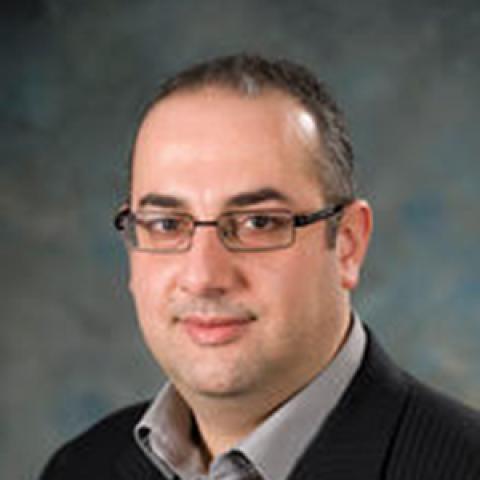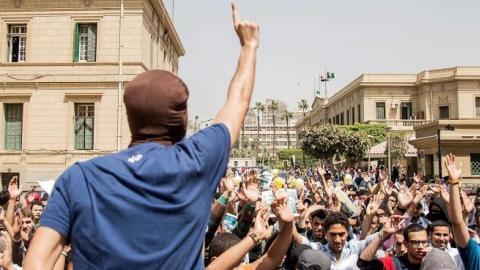Earlier this year, President Abdel Fattah el-Sisi drew international attention with a speech calling for a “religious revolution” in Egypt. He set aside prepared remarks for the celebration of Prophet Mohamed’s birthday, and in front of religious scholars from the leading center of Sunni Islam, Al Azhar, offered his heartfelt remarks in colloquial Egyptian Arabic, in part admonishing them for the state of Islam in the world. Going beyond anything previous leaders have stated, he decried the dominant religious thought and discourse, which he said had become too closed and antagonistic to the world. “It’s inconceivable that the thought that we hold most sacred should cause the entire nation to be a source of anxiety, danger, killing and destruction for the rest of the world.” Sisi said the problem was not in Islam as a religion, but rather that it was rooted in the dominant religious thought and discourse—“that corpus of texts and ideas that we have sanctified over the centuries, to the point that departing from them has become almost impossible.”
While receiving condemnation from Islamists who called him an apostate and argued that his words showed a clear departure from Islam, the speech was widely hailed in Western circles as the long-awaited opening for reform in Islam. Sisi’s description of the role Islamic religious thought played in radicalization certainly stood in contrast to President Obama’s standing refusal to utter the word ‘Islamist’. Absent, however, from both condemnation and praise is the fact that Sisi’s speech, while surely courageous, lacked any formal plan or implementation mechanism. Neither Sisi nor the Egyptian state has a strategy to combat extremism. Indeed the official religious establishment, represented in both Al Azhar and the official Dar al-Iftaa, the state body responsible for issuing religious opinions, quickly downplayed the call for religious reform, launching instead “a national campaign aiming at correcting the image of Islam through social media, foreign visits, and publications.” Such efforts are unlikely to result in anything meaningful—much less a religious revolution.
How then could such a religious revolution be launched?
A good place to start is Egypt’s schools. Despite numerous attempts at reform, often funded by Western governments, Egypt’s current educational system is an incubator for extremism and radicalization. This radicalization includes increasing intolerance towards non-Muslims and hostility towards the outside world. Egypt is a breeding ground for local and international terrorism. Attempting to address the question of intolerance, radicalization, and extremism in the Egyptian educational system must begin by addressing the very structure of that system and not merely changing curricula as previous efforts have attempted.
Large parts of Egypt’s educational system remain outside the control of the Ministry of Education and in the hands of the very institution Sisi was addressing: Al Azhar. Al Azhar school students represent 7.6 percent of pre-primary students, 11.4 percent of primary students, 9.7 percent of middle school students, and 24.3 percent of non-technical high school students. With more than 300,000 students in total, Al Azhar University is the largest university in Egypt, representing 17 percent of all university students in the country. This stands in contrast to private universities, which enroll a mere 3 percent of Egypt’s university students.
Al Azhar receives most of its funding from the government, even though it excludes non-Muslims from its schools. It also receives private donations, with the result being that its schools are comparatively better funded than those solely funded by the government, which leads to a better teacher-student ratio and less crowded classrooms. Students at Al Azhar schools use different curricula than the government-funded ones, and while they teach the same subjects overall, they also include a number of additional Islamic subjects.
Students studying in Al Azhar-managed schools continue to be the most prone to radicalization among Egyptian students and are heavily exposed and indoctrinated in texts that increase intolerance of non-Muslims and the world. The textbooks used in these schools teach intolerance of “the other” as the norm. Students are taught that they should not greet infidels, and anti-Semitism flows through the whole curriculum. Jews are portrayed in textbooks as treacherous, greedy, exploitative, deceptive, fomenting dissension, and hostile. The rules of Dhimmitude are taught not as a historical social practice but as the right religious framework in dealing with non-Muslims. Textbooks also discuss Jizya—the tax levied on unbelievers in Muslim lands—as a matter of right religious practice. Textbooks inform students that building new churches in the land of Islam is not permissible.
The fact that they are exclusively Muslim schools means that those students are not exposed to other Egyptian citizens who adhere to a different religion, increasing their alienation from them and allowing false perceptions and intolerant views to grow. It is thus no surprise that Al Azhar school graduates are perfect recruits for the Muslim Brotherhood and other Islamist groups attempting to undermine the regime.
Bringing Al Azhar schools under the supervision of the Ministry of Education is an absolute necessity for any meaningful change in Egyptian society. Their toxic curriculum needs to begin to conform to the standards set in the nation’s general curriculum.
And the general curriculum, too, needs serious attention. Previous attempts at reform, however serious they may have been, have failed because they have focused on haphazardly inserting a few sections on religious tolerance without any attempt to introduce a broader framework for these concepts. Introducing the concept of universal values in the school curriculum must be a cross-disciplinary task. Serious reform of the Egyptian educational system that aims at broadly increasing tolerance cannot focus on a subject or two and ignore the rest. Values of equality, peace, respect for other opinions, and citizenship must be stressed throughout the curriculum. The curriculum should stress that diversity is not only natural but also plays a positive role in a nation’s progress.
The subject of history is an area that needs the most immediate attention. The texts taught in Egyptian schools need to introduce world history—the history of ideas and world religions and cultures. As things stand, students graduate with no knowledge of important world historical events, with the outside world and its cultures besides Muslim countries an enigma to them. No information is given on any impact the world, its cultures and civilizations have had on Egypt beyond colonialism. The void is filled by Islamists, who stuff impressionable minds with falsehoods and conspiracy theories.
Even in studying their own history, students are unaware of the contributions Christians, Jews and women have made to Egyptian society, making them unable to properly understand the richness of their own heritage. As it now stands, Jews are completely whitewashed from the history curriculum, despite a large Egyptian Jewish community having thrived there in the not-so-distant past. Introducing stories of Jewish contribution in Egypt’s history, such as Jewish participation in the creation of the first national bank, and their role in the 1919 revolution, would be a good first step towards countering the current virulent anti-Semitism that is all too prevalent in Egyptian society.
Christians, while mentioned, are marginal characters, despite making up the largest minority in the country. While all Egyptian students, Christian and Muslim alike, learn significant information about Islam—its theology, culture and history—basic facts about Christianity are completely absent from the curriculum making the belief system of 10% of the population completely alien to its majority. Although textbooks include some very limited quotes from the Bible, morality is largely presented as Islamic.
Introducing the important contributions of women in Egyptian history such as Princess Nazli Fazl and the role her literary salon played in the formation of the nationalist movement, Princess Fatma Ismail’s role in the establishment of Cairo University, champions of women’s emancipation Hosa Shaarawi and Doria Shafik, may play an important role in challenging patriarchal notions. All these stories must be implanted throughout the curriculum if they are to have a real impact and not just in history but also in teaching Arabic, sciences, and languages.
Reforming the curriculum, of course, means nothing without a serious attempt to educate teachers themselves. Given the instrumental role that teachers play in how any curriculum is taught and understood, as well as being early role models for their students, adequate resources must be set aside for their training. Given that teacher education is under the supervision of the Ministry of Higher Education, cooperation between the two ministries is essential for the success of reform. President Sisi may also consider merging the two ministries as a step towards creating a uniform educational policy. The Ministry of Education should reverse its policy of transferring extremist teachers to far away governorates, making these governorates the perfect recruiting ground for extremists, and ensure that no extremist teacher is allowed in the classroom.
While extremism and intolerance has grown in all segments of Egyptians society and Sisi’s call for confronting extremism requires a comprehensive counter initiative that involves civil society, the media, and religious institutions, any attempt to address extremism must begin with the educational system. As the means by which young men and women are transformed into mature citizens capable of contributing to their country’s development, reforming the educational system with an aim of countering extremism and encouraging values of tolerance and pluralism is at the forefront of the war of ideas for the hearts and minds of Egypt’s citizens.















